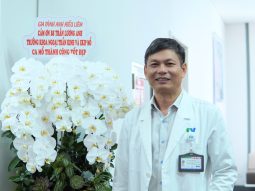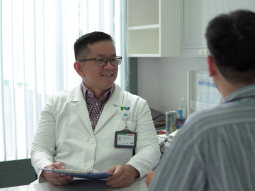Dr Ly Quoc Thinh doesn’t perform surgeries, but he has nearly three decades of experience working closely with surgeons. Dedicated to anaesthesiology and resuscitation, Dr Quoc Thinh and his colleagues ensure the success, safety, and comfort of FV patients.
“I’m going to take care of you, be a good little one…” are the familiar comforting words heard by FV Hospital’s surgical team in the hallway when a paediatric patient is about to be taken into the operating room. Holding the child in his arms, whispering in a soothing, loving voice like a lullaby, is how Dr Ly Quoc Thinh, Head of FV’s Anaesthesiology & ICU Department, reassures and comforts young patients as they prepare for surgery.
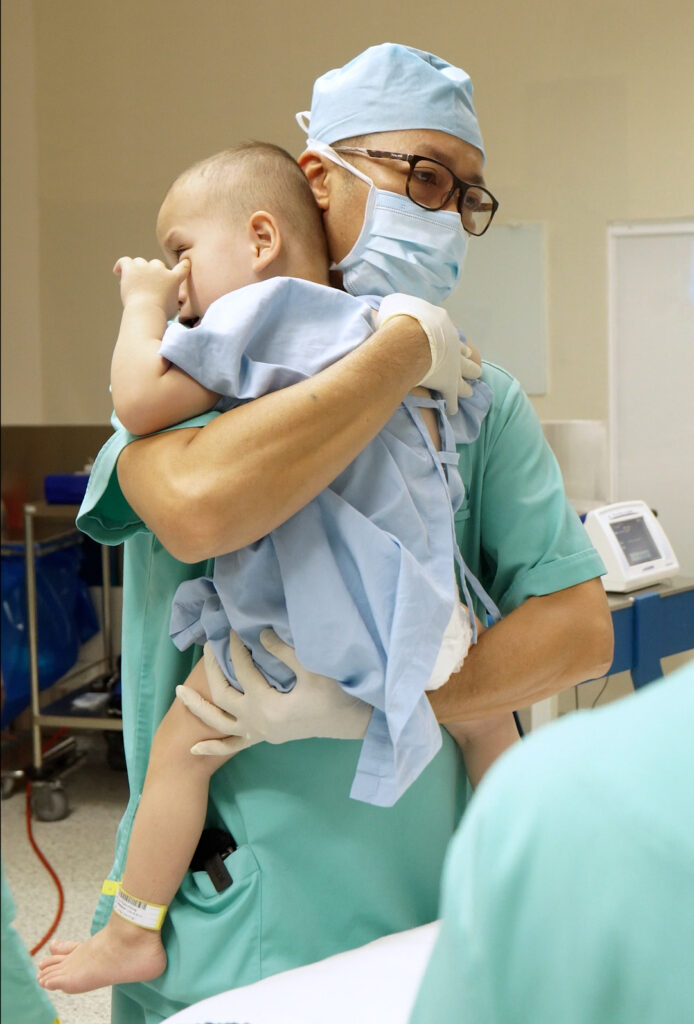
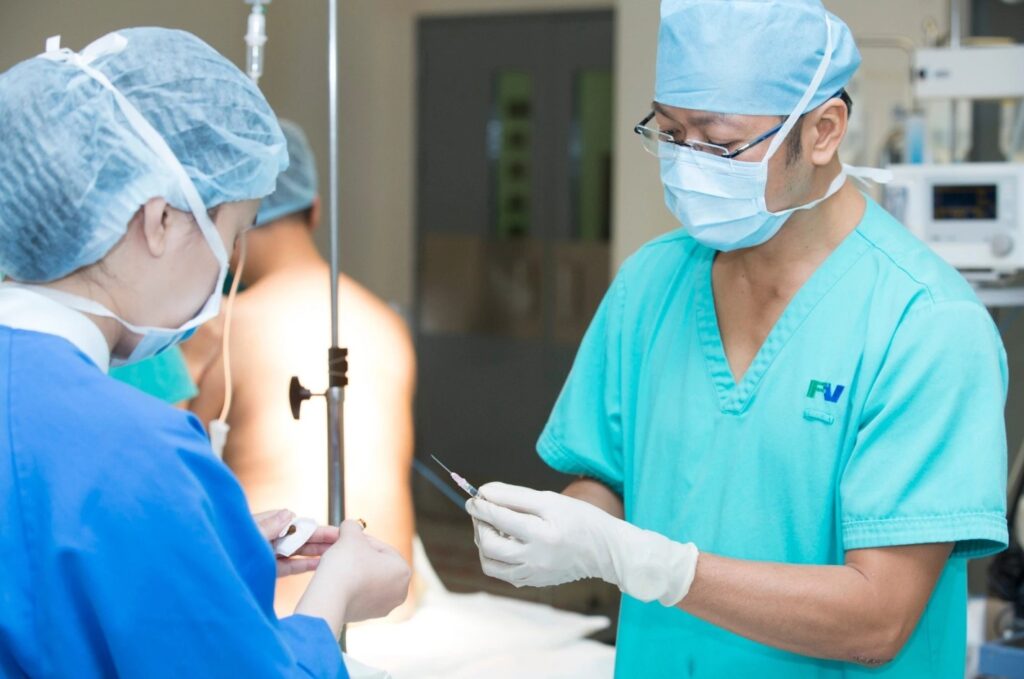
Dr Ly Quoc Thinh is considered the “loving father” of thousands of paediatric patients.
Dr Ly Quoc Thinh has performed tens of thousands of anaesthesia procedures over his 30-year career, ensuring patients have a “suitable anaesthesia procedure, sleep peacefully, and wake up safely.”
Throughout every surgery, Dr Thinh and his team of “anaesthesiology guardians” monitor the patient every second, ensuring they are breathing easily and sleeping peacefully.
The “loving father” of thousands of paediatric patients
Entering the medical field, Dr Ly Quoc Thinh initially intended to become a surgeon, dedicated to saving lives with a scalpel. However, when he began his career at the Children’s Hospital, he noticed the shortage of Anaesthesiology and Resuscitation specialists and decided to pivot.
“When I shifted to Anaesthesiology and Resuscitation, I discovered the beauty of the work I was doing. Every effort by each member of the team is a crucial factor in helping the patient get through the surgery safely,” Dr Thinh recalled.
Anaesthesiology and resuscitation is a specialty that carries significant responsibilities for the safety of the surgery. In every operation, the anaesthesiology team is always the first to arrive and the last to leave, coming to the operating room early to prepare, administering appropriate anaesthesia for each patient, managing pain, monitoring vital signs, and ensuring safety before, during and after the surgery. They continue to care for patients during recovery in the Intensive Care Unit (ICU), working alongside surgeons to effectively manage postoperative pain.
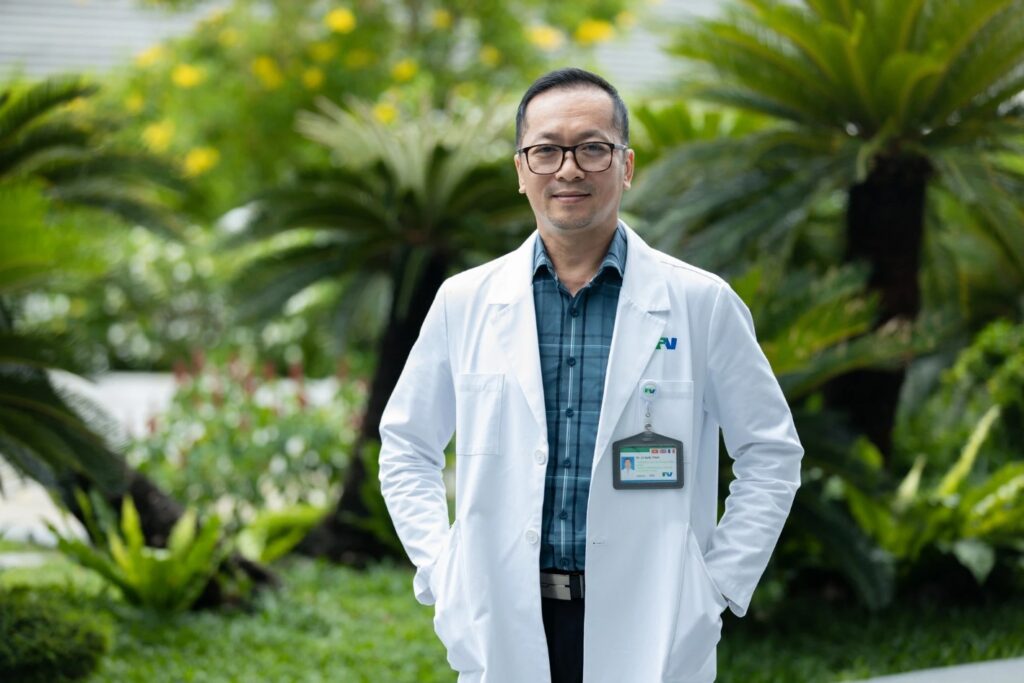
During his years at the children’s hospital, Dr Ly Quoc Thinh honed his skills by assisting in surgeries for children, including newborns just a few days old. Providing safe anaesthesiology and resuscitation for newborns is one of the greatest medical challenges: their bodies are not fully developed, with limitations in lung volume, blood vessels, and heart function, so anaesthesia for surgeries require a great deal of caution and ongoing meticulous calculations by the doctor.
“With young paediatric patients, the difficulty lies in the fact that they cannot communicate and do not fully understand what they are facing. Their bodies are not fully developed, making them more susceptible to risks and complications compared to adults. Moreover, children, are usually always close to their parents, so when they must be apart for a certain period, they feel insecure and afraid,” Dr Thinh explained.
Many paediatric patients become frightened and cry when entering the operating room. Their fear significantly impacts the anaesthesia process and their psychological state when waking up after surgery. The time spent studying and working at leading paediatric hospitals in France helped Dr Thinh find a solution to this issue. Instead of allowing the children to approach the surgery passively, he chose to explain the procedure clearly and familiarise them with some of the tools they would see during anaesthesia. This helps the children form some understanding and awareness of what they are about to experience, which relaxes them.
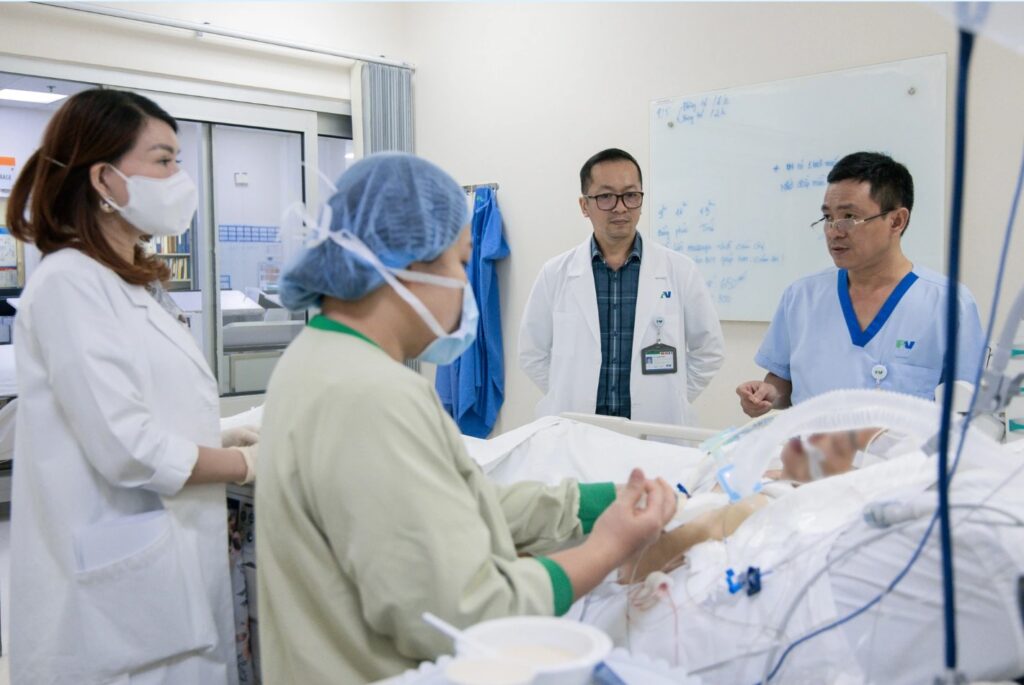
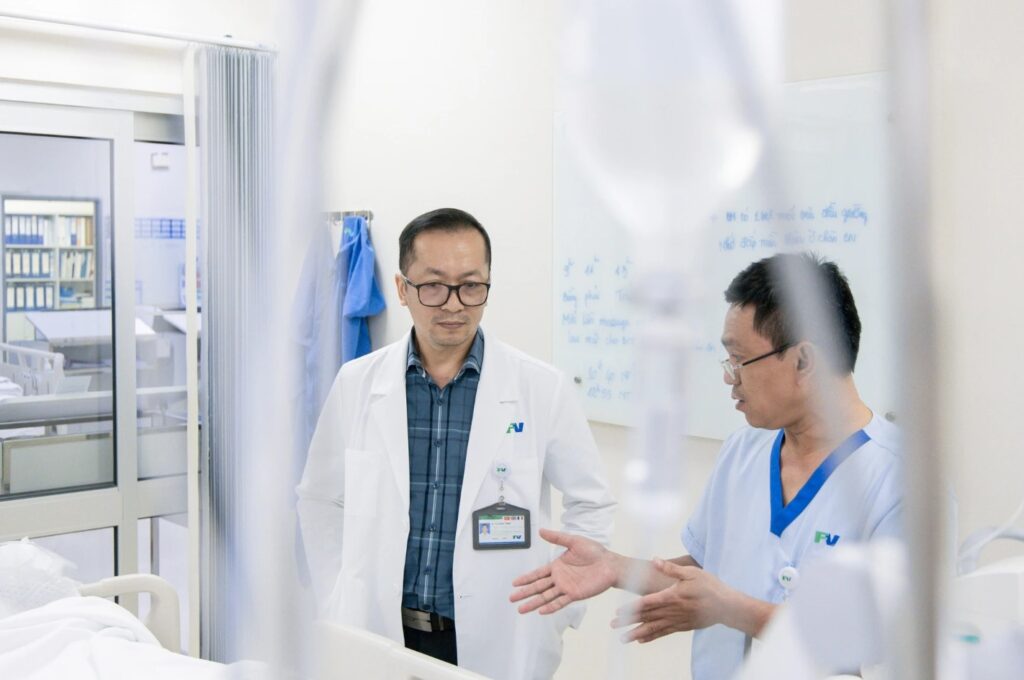
Dr Thinh is responsible for both anaesthesia before surgery and resuscitation for patients after surgery.
“This is a technique I learned by observing my colleagues in France. When children are familiarised with the anaesthesia mask or other tools, they feel safer and become more cooperative,” Dr Thinh explained.
When working with young patients who cannot communicate, Dr Thinh makes an effort to spend time with them before surgery, receiving them from their parents’ arms and comforting them until they enter the operating room. His team is accustomed to hearing his soothing words, “Your mummy and daddy love you. I’m going to take great care of you,” as he reassures the children. This affectionate way of addressing them helps reduce their anxiety when they have to be separated from their parents.
Continuously overcoming challenges in the field of anaesthesia and intensive care
In 2007, while serving as Deputy Head of the Department of Anaesthesia at Children’s Hospital 1, Dr Ly Quoc Thinh made the decision to join FV Hospital to seek new challenges for his career.
“I chose FV because I knew it was a leading international environment, offering many challenges but also resources for doctors to help patients more effectively, says Dr Thinh, sharing his reasons for choosing FV for the next step in his professional journey.
“FV’s strength comes from its transparent work environment, access to the best equipment and medications, and the capability to perform complex medical procedures according to leading medical standards. The demands and expectations regarding a doctor’s abilities must also correspond.”
At FV Hospital, Dr Thinh expanded his expertise by taking on the responsibility of anaesthesia for elderly patients with multiple underlying conditions. This group faces a significantly higher risk of surgical complications compared to normal patients, requiring meticulous attention for every anaesthesia procedure.
Before each surgery, Dr Thinh conducts pre-anaesthesia consultations, assessing the patient’s health status based on preoperative tests. He also participates in multidisciplinary consultations with relevant specialties or hospital-wide consultations, when necessary, all aimed at ensuring patient safety during surgery.
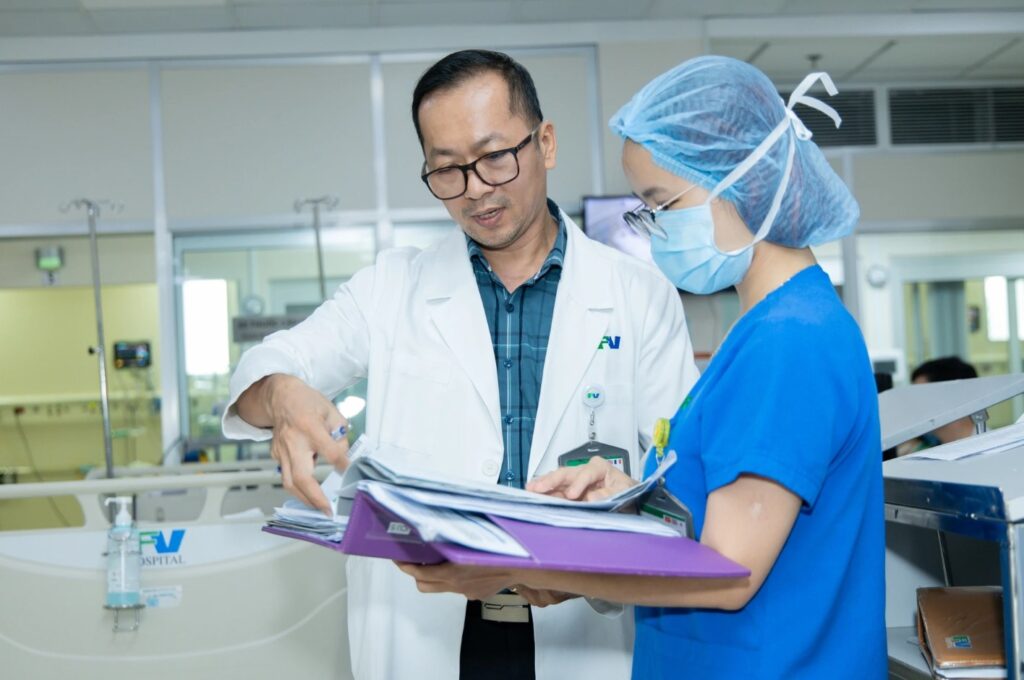
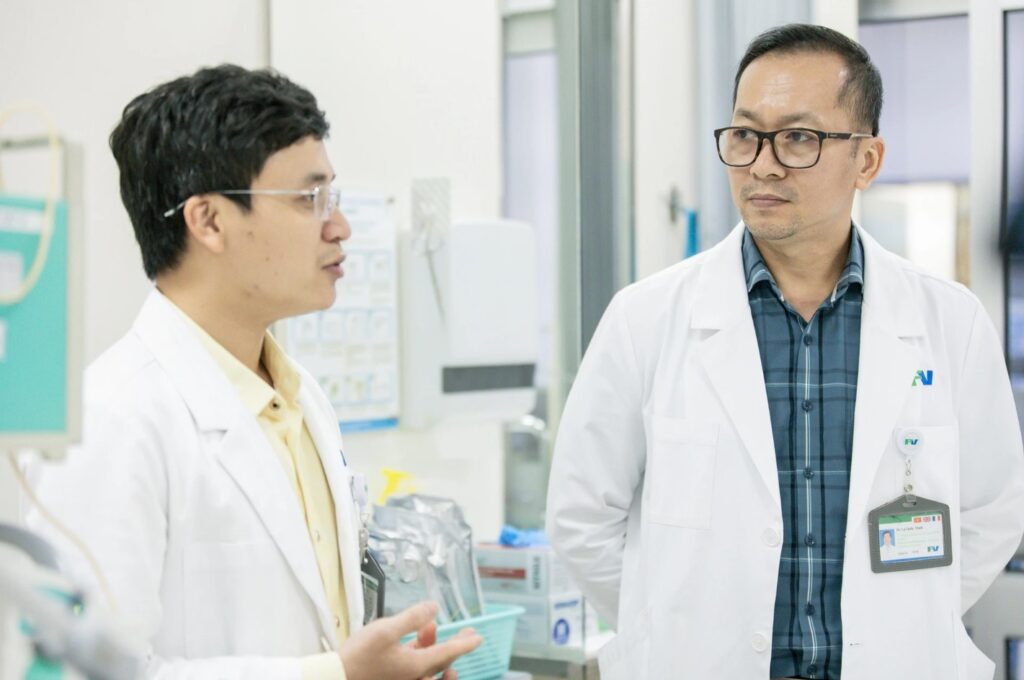
The workload of anaesthesiologists is large
The team will then propose the anaesthesia method, appropriate resuscitation strategy, and prepare the equipment for the surgery. During this time, doctors will discuss patients the benefits and risks of the methods chosen with the patient’s family, and address their concerns about the surgery.
“Any surgical procedure carries inherent risks, and the task of the anaesthesiologist is to minimise the likelihood of complications to the lowest possible level. We must explain the procedure to patients and their families so they can understand and feel at ease when entering the operating room. Sometimes people say we ‘keep a vigil while the patient sleeps’ but that alone is not enough to describe the work of an anaesthesiologist,” added Dr Thinh.
As Dr Thinh became renowned as the “compassionate father” in the anaesthesiology-resuscitation field, the number of paediatric patients received by FV increased significantly. FV’s modern infrastructure, advanced technical equipment, and collaboration with leading experts has made the Hospital a trusted provider. Many hospitals and paediatricians refer complex surgeries for paediatric patients to FVH.
One of Dr Thinh’s most challenging cases involved performing surgery on a preterm infant born at 26 weeks with retinopathy of prematurity. The surgical difficulty was compounded by the complex eye condition in the infant, who weighed less than 1.5 kg, alongside congenital heart disease and lung fibrosis due to continuous ventilation.
The infant’s condition posed a significant challenge for the anaesthesia-resuscitation team who had to develop a suitable plan for anaesthesia, surgery, and subsequent recovery. Meticulous planning coupled with Dr Ly Quoc Thinh’s extensive experience and adeptness at handling any situation resulted in a successful surgery.
Always dedicated wholeheartedly to every small task
Dr Nguyen Thi Lam Giang, former Head of Anaesthesiology & ICU at FV Hospital, shared her assessment of Dr Ly Quoc Thinh, who is both her colleague and mentee: “Dr Thinh exudes a calm demeanour, is highly reliable, and always knows how to reassure those around him. Patients and their families can trust his approachable and empathetic nature and have complete faith in his capabilities.”
Through their collaboration, Dr Lam Giang observed that Dr Thinh possesses extensive experience, strong diagnostic skills, and sensitivity in the field of anaesthesia. Additionally, in the realm of intensive care, Dr Thinh is known for his meticulous approach and dedication to continuous learning.
Dr Thinh, the current Head of Anaesthesiology & ICU at FV Hospital, expressed that anaesthesiologists often face significant pressure while treating critically ill patients in the ICU who have a life-threatening condition or require intensive post-operative care. Doctors must monitor vital signs continuously, 24/7. Over his long career, Dr Thinh has developed an acute ability to discern even the slightest sound from monitoring devices in the ICU that signals a change in a patient’s condition, enabling him to respond promptly.
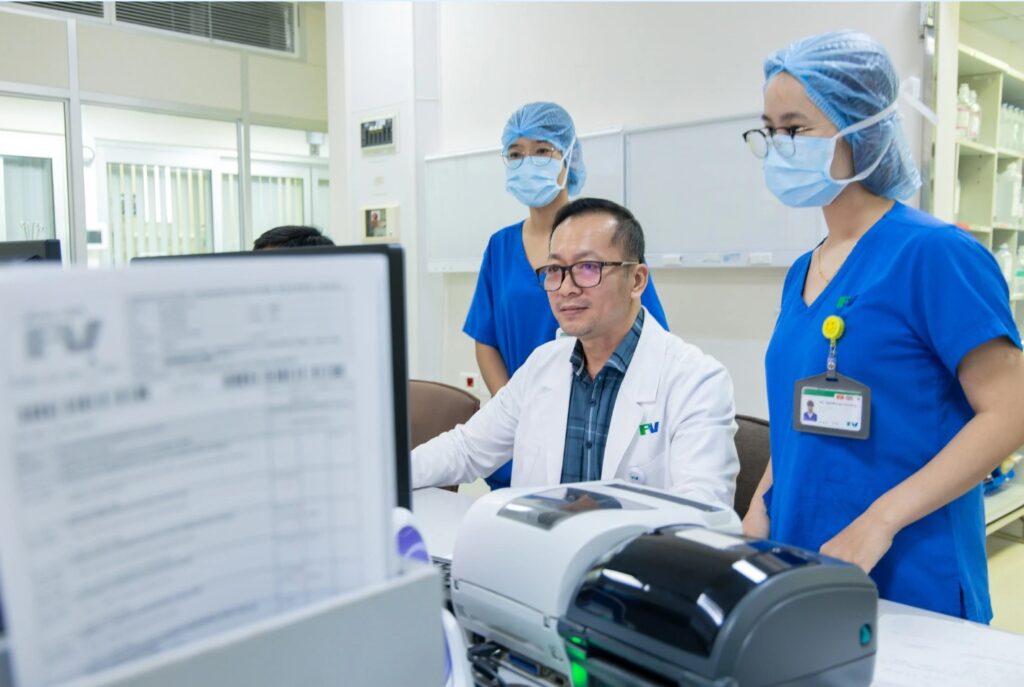
Doctors in the ICU face additional pressure from other aspects of their daily work, notably moments counselling frustrated families when treatment processes do not yield the desired results for the patient.
Mr Do Chi Tam, who has worked alongside Dr Ly Quoc Thinh in the ICU department for many years as the Head Nurse of ICU, shared his impression of Dr Thinh’s steadfastness and composure in all circumstances.
“The ICU is often referred to as the ‘frontline’ because every case here involves patients in critical condition. The pressure comes not only from caring for the patients but also the expectations of the patients’ families. However, it’s precisely because of this that Dr Thinh’s calmness, diligence, and caution stand out even more.”
On many occasions, Mr Tam and the staff in the ICU have witnessed families of patients expressing anger, but Dr Ly Quoc Thinh’s approach consistently helps the patient’s family feel reassured and regain their composure.
Dr Thinh further shared, “When anxiety and pressure build up, the emotions of the patient’s family also become heightened. Having experienced such situations myself, I understand their feelings. What I need to do is help the patient’s family regain balance and address any questions they may have during the treatment process. Seeing a loved one in the ICU can stir up intense emotions, which is something I can empathise with.”
For Dr Thinh, alongside his professional responsibilities, developing the department is another of his crucial tasks. Currently, the ICU at FV Hospital has a capacity of 22 beds, handling a significant number of surgeries daily. Therefore, one of Dr Thinh’s concerns is developing a larger and more capable team to meet patient needs.
“I consider it fortunate that FV is a place that attracts many young, talented doctors. Naturally, capable and ambitious individuals have different personalities. What I aim to do is foster harmony and create the best environment for each person to excel, maintaining their passion for learning, research, and dedication to patient care. Providing opportunities and motivation helps them become the foundation of patient safety in the future,” Dr Thinh added.
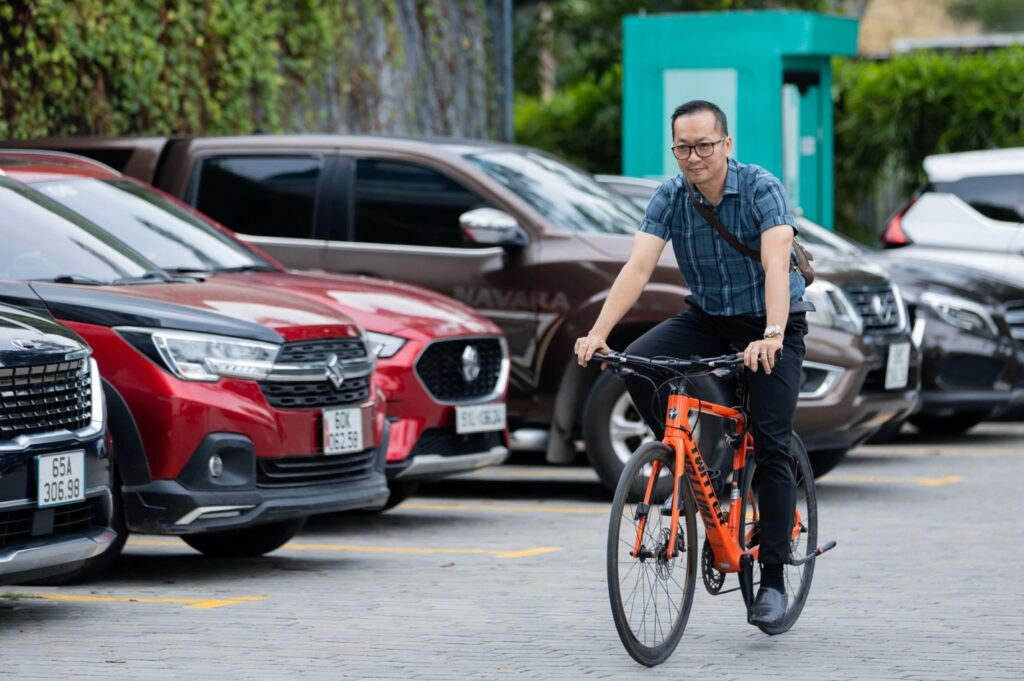
At the end of our hour-long conversation, Dr Thinh bid us farewell and leisurely pedalled his bike home in the dimming daylight. He explained that with limited free time, cycling helps him relieve fatigue after a day’s work and get some exercise.
Watching Dr Thinh blend into the bustling crowd, I still recall his humble smile and composed demeanour as Head of Anaesthesia and Intensive Care at FV Hospital. Whether recounting brain surgeries to preserve the sight of premature infants with fragile bodies, comforting babies separated from their mothers before surgery, or detailing personal interests, Dr Thinh always shares openly and modestly.
He approaches everything with gentleness and caution, guided by his philosophy of paying attention to every detail, doing his best, remaining humble to learn continually, and enriching his knowledge and skills to fully commit to his profession.

 Vi
Vi 

